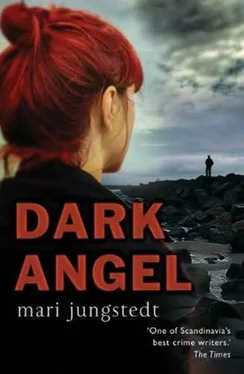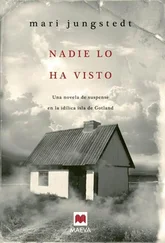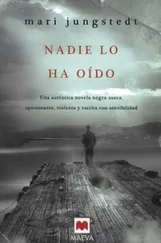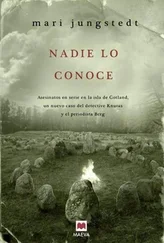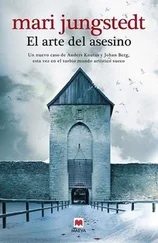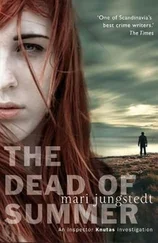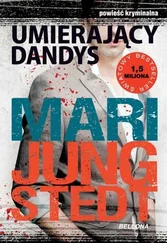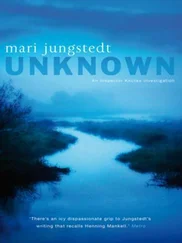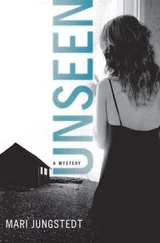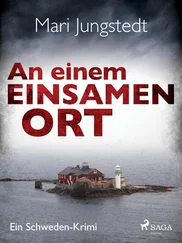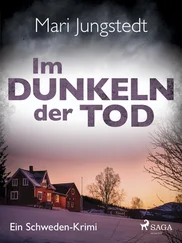Knutas was overcome with tenderness for the slight figure sitting near the window. He felt a prickling in his hands and legs, as if tiny needles were sticking into his skin. For a second everything went black, and he had to hold on to the doorpost. He hadn’t slept a wink and his body ached with fatigue. When he left his hotel room, he had made up his mind. There was nothing else to do. He had to ask Karin to resign. To leave the police force. He took a step forward, then another. The distance to her table was about 10 metres. Moving like a sleepwalker, he continued forward, his eyes fixed on her face. Suddenly she felt his approach and looked up. Their eyes met.
No, he thought. I can’t make a decision right now. I need more time to think things through.
‘Good morning,’ he said.
‘Good morning.’
‘Listen, I’d rather not discuss what we talked about last night. I need time to think.’
‘OK. But when we get home, I plan to hand in my resignation. Just so you know. I don’t want to cause you any problems, Anders.’
Her words made him feel panic-stricken. Once before she had almost quit her job, and he didn’t want to go through that again.
‘Let’s not do anything hasty. You’re not responsible for my bloody welfare. Whatever I decide, it’ll be my decision. Please give me some time to think it over,’ he pleaded. He could hear for himself how insistent he sounded. ‘You’ve had to carry too much on your own. Try to let it all go for the time being.’
She gave him a wan smile.
They got the rental car from the Katarina garage, just a stone’s throw from the hotel. They did their best to ignore what they were both thinking about and tried to focus on the task ahead of them. Their personal problems would have to wait until later.
Knutas found it surprisingly easy to make his way through the city. At first he kept to the shoreline, driving along Skeppsbron and Strandvägen, past the TV and radio building on Oxenstiernsgatan. Then he turned on to Valhallavägen, one of Stockholm’s most fashionable streets, which was designed like a French boulevard, very wide with a double row of trees down the middle. It came to an end at Roslagtull, and from there they continued straight ahead along Norrtäljevägen. Presumably he could have taken a more direct route through the city, but at least he had found the right road. And the view was spectacular, with the water glittering in between all of Stockholm’s islands and the magnificent buildings of the royal palace, the National Museum, the Dramaten theatre, and the Nordic Museum on Djurgården, which resembled a renaissance palace with its turrets and towers.
As the investigation had progressed, Knutas had grown more curious about Mikaela Hammar. She had created a whole new life for herself away from Gotland. She had married a mainlander and moved to Stockholm’s archipelago. There she started a riding school, which she and her husband ran together. At the same time, she worked for a humanitarian aid organization.
It was quite a drive. Knutas checked his watch as they passed Norrtälje, with at least 10 kilometres still ahead of them. It was just past eleven. Their plane home left at three thirty. They had plenty of time.
When they drove across the bridge to the island of Vätö, he was reminded how different the archipelago was from Gotland. An entirely different kind of landscape. No long sand dunes here. Instead, he saw cliffs, boulders and skerries. Vätö was one of the bigger islands in Stockholm’s archipelago, with about a thousand permanent residents, shops, a post office, library and school. Many people who lived on the island commuted to Stockholm or Norrtälje. Mikaela Hammar and her family lived in Harg, at the centre of the island.
They came to a big old gate at a curve in the road and turned into a horse pasture. The car bumped along on the narrow tractor track, and then the farm appeared beyond a hill. It stood there in lonely majesty, atop a plateau with hills on one side and an expansive view of the countryside on the other.
Several Fjord horses came trotting towards Knutas and Jacobsson as they climbed out of the car.
Knutas, who was rather frightened of horses, hurried towards the gate. The farm consisted of a main building, painted Falun red, and two smaller buildings forming wings on either side of it. Further away on the property was a barn with a paddock in front. A riding track was visible beyond the barn. The front door of the house opened and a plump suntanned woman in her mid-thirties came out on to the porch holding a tray with a coffee pot and cups. She smiled and welcomed them warmly.
‘I was thinking we could sit outside. It’s such a beautiful day.’
She led the way to some patio furniture at the side of the house with a view of the hills. Cowslips and lilies of the valley were already in bloom. It was almost like summer.
‘Thank you for your willingness to meet with us right after returning from such a long trip,’ Knutas began.
‘It’s no problem. I understand that this is important.’ A trace of sorrow was evident in her voice.
‘You know what’s been going on. By all accounts, your mother was first the target of a murder attempt by poisoning, and then barely escaped an arsonist’s fire. We’re still not entirely sure whether the murder at the conference centre was actually aimed at her, but that’s what she claims. And we’ve had her story at least partially confirmed by witnesses. What’s your reaction to all of this?’
‘If somebody is trying to kill my mother, I’m not really surprised, to be quite honest.’
‘Why’s that?’
‘There’s a reason why I’ve broken off all contact with her. My mother has a talent for obliterating everyone close to her.’
‘In what way?’
Mikaela Hammar sighed. Knutas noted that she was not at all like her mother. She was tall and quite stocky, with long, wavy light brown hair and blue eyes. There was actually nothing about her that reminded him of Veronika Hammar.
‘I grew up with a mother who was so self-absorbed that she never really saw me or my siblings. I’ll stick with describing my own experience. As a child I was made to feel invisible and I was never treated with respect. Each day brought new offences, any problems were simply shoved under the rug, and my mother always acted the martyr. Our lives were filled with dishonesty. It was like living on a stage set. I went through long periods of depression, which got worse when I was a teenager. Things got so bad that I started cutting myself and developed eating problems. I would binge on food and then throw up afterwards. That went on for five years, and she never noticed a thing.’
‘How old were you at the time?’ asked Jacobsson.
‘It started when I was fifteen and lasted until I moved away from home. That’s when I met my husband, thank God. He was my salvation. Without him, I wouldn’t be alive today.’
She spoke in a matter-of-fact tone, without a shred of self-pity.
‘What caused these problems?’
‘I think that I’d been suffering for a long time because no one really paid any attention to me. There were probably two reasons why I started cutting myself. Partly from anxiety and partly because deep inside I wanted someone to see me, notice me. Discover what was going on. But nobody did.’
‘What happened when you met your husband?’
‘I met him in the summer. He came to Gotland on holiday, like so many other people. Of course my mother criticized everything about him. The way he looked, the fact that in her eyes at least he didn’t have a very good job, and that he lived in Stockholm. She complained about everything. But for once I refused to listen to her. And I thank God for that. For the first time in my life I felt truly loved, and it was wonderful. Here was someone who liked me just as I was, without reservation and without making any demands. He listened to me, let me speak my mind, let me have my own opinions. Because of him, I grew as a person and I started believing in love. I saw that love actually existed and could last. I will always be eternally grateful to him for that. He healed me.’
Читать дальше
